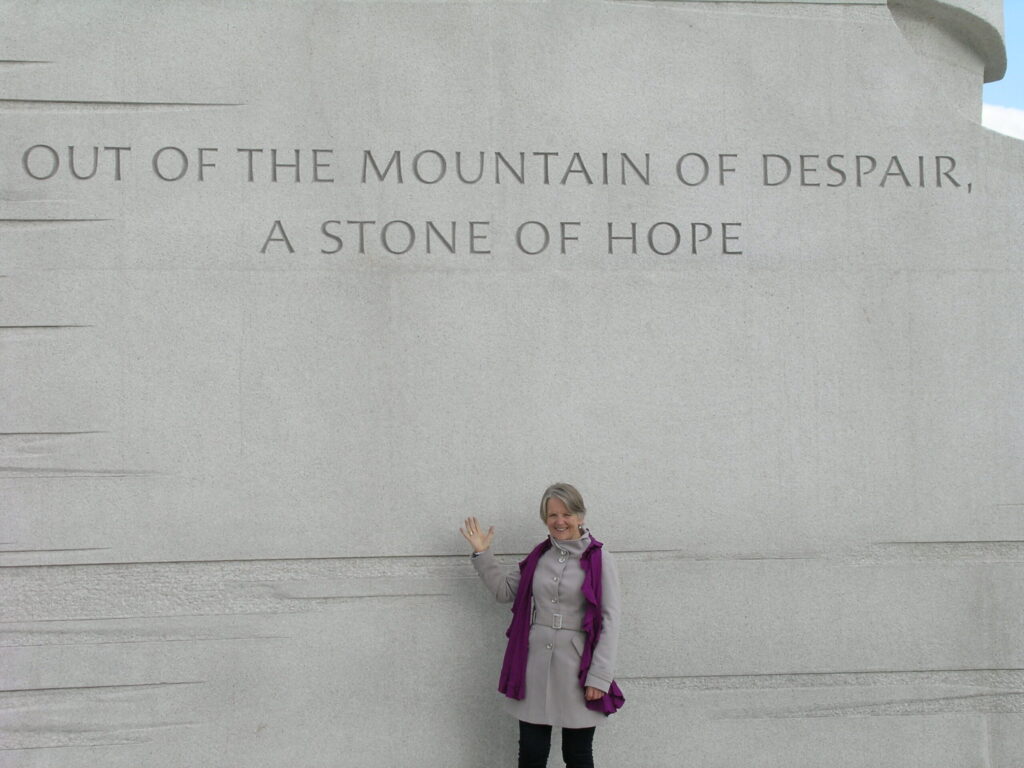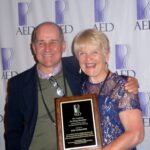Finding a family in eating disorder advocacy

Finding a family in eating disorder advocacy
Often, during recovery, I never wanted to hear the term “eating disorder” again. Why then, have I embraced the term and become involved in eating disorder advocacy?
Why not shut out the eating disorder experience and pretend the big gap that the illness ate in my life never happened? Maybe this would have been possible if intervention with evidence-based treatment had been swift and effective. But I had no access to early intervention, and my illness became embedded as part of who I am.
I was in my early 30s when treatment began for the anorexia nervosa that developed at age 11. I did not break free of the manipulations and commands of the eating disorder taskmaster until my mid-50s.
When advancing closer to healthy self status that would signify freedom, I sometimes became impatient. I had “had enough”. I wanted out. I rebelled. I wanted to live like those around me. I wanted fun and freedom. I would try. I would live life on the edge. I would wine, dine and dance at parties. But I felt a fake. I was wearing a mask. I had to pretend because not everything that the eating disorder had damaged in health and life opportunities, could be retrieved.
I had no idea what the word “normal” meant
My emotional development had been sabotaged since childhood. Efforts to be like others in mainstream always brought me undone. I had no idea what the word “normal” meant. I only knew what it was like to be me, and to think like me. Eventually I accepted that denying the eating disorder’s impact on my life, even when thoughts and behaviours became of my healthy self, was a sure way to fail.
Fulfilment, I discovered, lay in embracing the eating disorder that had been part of my life for four decades. The answer was not in shutting the door on this horrid something that had shaped and influenced my life but in allowing it to travel forward with me. The important difference now was that my healthy self was in charge. I was an expert in lived experience of the eating disorder’s sneaky ways. I was no longer scared of it. This was my pay-back time.
By sharing stories about the eating disorder, and exposing its devious and bullying characteristics, I began to find fresh purpose and meaning in life. Advocacy had the effect of propelling me along on an ongoing journey of self-discovery, healing and joy. Placing the eating disorder in the context of my life became easier.
I had kept my story within for more than 40 years
I tentatively entered the field of eating disorder advocacy in 2009. I was persuaded by Claire Middleton, founder of The Butterfly Foundation in Australia, to share my story at an information evening for parents and grandparents at an all-girls’ school in Melbourne. The event signified a major “coming out”. For the first time I would be sharing my inside story in a public forum. I felt very nervous.
My illness experience had filled me with shame and stigma and left me alienated from my parents and sister. Encouraged by Claire, who insisted that my story counted, I spoke in the hope that other children would be spared the pain of being misunderstood, and rejected, like me.
I experienced an awakening that evening. Since early childhood I had been petrified at the thought of standing on a stage and speaking. I would have panic attacks. My face would turn beetroot red and my mind would freeze. My eating disorder’s rantings and constant criticisms had made me feel inferior and inadequate. But my life was different now. My healthy self was about 90 per cent strong. The eating disorder’s attempts to sabotage this special event, taking place in a supportive and safe environment, were defused.
Magical things began to happen
When members of the audience stayed behind after the session to speak with me, I began to feel validated as a person. These people knew that I had an eating disorder and yet, remarkably, were treating me with respect. Magical things began to happen. I started to feel accepted – sadly, not by my family of origin, but by people who when they heard my story did not call me silly or neurotic; they did not shy away; rather, they helped me to feel appreciated as someone who was a person first and foremost, and as someone whose illness experience counted.
Many presentations and national and international conferences, nine books, this website and a PhD in Creative Writing, (focusing on the diary) would evolve over the next 12 years as my advocacy role took root. Amazing things can and do happen when one breaks free from an eating disorder and channels the illness negativity into positive pursuits!
I have never felt triggered when working in the field of eating disorders. I attended my first eating disorder conference in late in 2009 – it was the Australian and New Zealand Academy for Eating Disorders conference in Brisbane. The conference theme was appropriately titled, Broadening horizons – innovative ways to expand the breadth and reach of eating disorder services. Prof. Kathleen Pike and Assoc. Prof. Brett McDermott presented the keynote addresses. The conference explored the topics of consumer/carer initiatives, and innovations in service delivery, treatment, and research and evaluation.
Lights began to go on in parts of my mind – ‘You understand!’
I felt like a mouse in the auditorium and feared I had no right to be present. All I had was experience that had shaped my life since age 11. Here I was, among people with many letters after their name. They were all somebody. It was during the plenary session that bells began to ring, and lights began to go on, in parts of my mind that had been held captive to anorexia nervosa for decades. I wanted to jump from my seat and yell, “You are describing my life!” “You understand!”.
Here I was, in my late 50s, for the first time meeting people who understood my “inner language”. I was now among people who accepted me as I was, inside and out. These academics and health professionals did not judge or refer to me as “the problem”. In their midst, I began to feel like a fledgling, gaining confidence to leave the nest and explore the world beyond.
The eating disorder field is akin to a family of choice

With Professor Daniel LeGrange, AED conference, San Francisco 2016
As a high-functioning person with anorexia nervosa, I had worked full-time as a journalist for 38 years, but now I embarked on the truly meaningful part of my life. No more secrets, shame or stigma. My inside story became my outside story. I was one. The field of eating disorders nurtured and filled a long-held need and yearning for a sense of belonging and connection. Involvement in advocacy filled the ghastly gap left by the illness. Very soon, the field of eating disorders became, for me, a family of choice.
I love my family of four children and five grandchildren, but I also cherish my family in the eating disorder field. This second family comprises researchers, clinicians, and people with ED experience, who understand and help me to feel at peace with the illness that robbed me of so much. Both families serve important roles in my life. In giving, I receive. Rather than feel triggered when working with families in the coalface of the illness, I feel validated, inspired, and enriched. When I attended eating disorder conferences or gatherings, I receive what feels like an injection of wellness. I feel blessed to have two families – one for my healthy self, and one that enables ongoing healing from losses sustained during the decades with anorexia nervosa.
I encourage you to make your experience with an eating disorder count, by becoming involved in advocacy. In helping others, you will help yourself.






Dear June, every time I read your story I learn a bit more about eating disorders, a bit more about sufferers, a but more about so many things but mostly a bit more about you. You truly have always been a stone of hope for as long as l have known you, at whatever stage we both have been at, you have always given me hope. This is a wonderful gift you have shared all around the world with people of every age and stage…it is an honour to know you in our normal, whatever that is, as I believe it is different for everyone. We are all unique and everyone has their own story as you say which is so very true. What a wonderful photo June. So true and so you. Love to you always, so grateful for the June as I’ve always known you. Xoxoxo
Dear Karyn, Thank you for your insightful and heartfelt message. Thank you also for helping to keep me grounded and focused, and thank you for sharing your life journey with mine. One day soon, we will ride the carousel again! With love, June xo
Hi June,
Thanks for your article. After 40 of anorexia and feeling as though I am close to shutting the door on this nightmare, I have felt as though I also have had enough of talking about it and wanting anything to do with this disorder.
As time has gone by I have felt a pull towards helping others but have no idea how to get involved in advocacy. Any ideas where to start?
Sonya
Dear Sonya, Thank you for reaching out … I hasten to reassure you that freedom can be gained from an eating disorder at every age. So remain hopeful at all times. Becoming involved in advocacy has helped me to maintain my recovery, and I encourage you to become involved too – do you live in the USA? If so, go to the NEDA website https://www.nationaleatingdisorders.org
If in Australia, click on the Butterfly link https://butterfly.org.au or in the UK, click on the BEAT link https://www.beateatingdisorders.org.uk
Don’t settle for just a bite of the cherry of life. You deserve the full cherry. Go for it!
Keep me posted on your journey!
Hugs, June